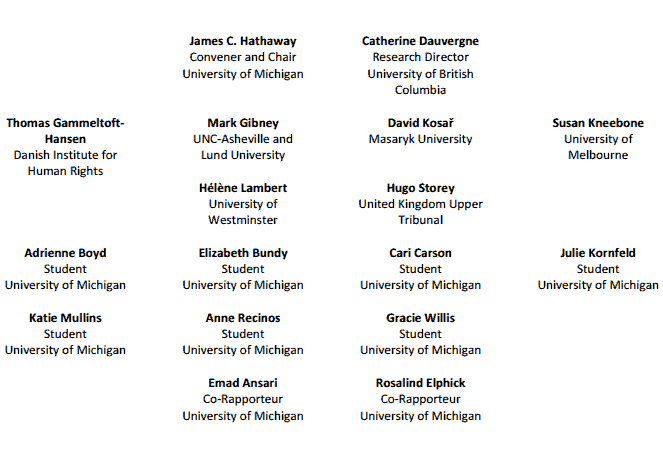Risk for Reasons of Political Opinion
Cite as: James C. Hathaway, The Michigan Guidelines on Risk for Reasons of Political Opinion, 37 Mich. J. Int’l L. 234 (2016), available at http://wp.me/P5WwJW-oV.
THE MICHIGAN GUIDELINES ON RISK FOR REASONS OF POLITICAL OPINION
The Convention relating to the Status of Refugees (“Convention”) recognizes as refugees those who, owing to a well-founded fear of being persecuted on the basis of inter alia “political opinion,” are unable or unwilling to avail themselves of the protection of their home country. State practice acknowledges that protection based on “political opinion” should not be limited to those individuals at risk by reason of their views about partisan politics. Beyond this, the absence of an authoritative definition of “political opinion” in either the Convention or international law more generally has allowed interpretive inconsistencies to emerge, both within and among jurisdictions. Further complicating the search for a consistent approach is a lack of clarity about how best to ensure that the social and political context of the country of origin is meaningfully taken into account in assessing the existence of a “political opinion.” With a view to promoting a shared understanding of the proper interpretation of “political opinion” within the context of Article 1(A)(2) of the Convention, we have engaged in sustained collaborative study and reflection on relevant norms and state practice. Our research was debated and refined at the Seventh Colloquium on Challenges in International Refugee Law, convened in March 2015 by the University of Michigan’s Program in Refugee and Asylum Law. These Guidelines are the product of that endeavor, and reflect the consensus of Colloquium participants on how best to interpret “political opinion” in a manner that ensures both fidelity to international law and the continuing vitality of the Convention.
GENERAL CONSIDERATIONS
1. As Article 1(A)(2) of the Convention sets a uniform standard for recognition of refugee status, it is desirable to seek consistency of interpretation both within and among states. Yet because a “political opinion” is informed by time and place, the search for consistency must not be an excuse for interpretive inflexibility. More generally, the Vienna Convention on the Law of Treaties requires that the text be interpreted in good faith, and in a manner that is consistent with the context, object, and purpose of the Convention as a whole. 2. It is thus especially important that interpretation of “political opinion” align with the purpose of the Convention’s nexus (“for reasons of”) clause, which establishes a principled delimitation of persons at risk of being persecuted. ”Political opinion” is one of five enumerated grounds for the recognition of refugee status, each of which is derived from non-discrimination principles and is to be understood in light of international human rights law.
“OPINION”
3. A decision maker should first turn her mind to the question of whether there is evidence of an “opinion.” 4. An “opinion” is a conscious choice or stance. 5. An expressed choice or stance necessarily constitutes an “opinion”; an applicant may, however, hold an “opinion” without having expressed it. 6. Even if not actually held, a choice or stance may be attributed to an applicant by the agent of harm or by the state failing or refusing to protect on the basis of her action, specifiable inaction, status, or other characteristic.
“POLITICAL OPINION”
7. Once an opinion is identified, the decision maker must determine whether it is a “political” opinion. 8. A “political” opinion is an opinion about the nature, policies, or practices of a state or of an entity that has the capacity, legitimately or otherwise, to exercise societal power or authority. A relevant non-state entity is one that is institutionalized, formalized, or informally systematized and which is shown by evidence of pattern or practice to exercise de facto societal power or authority. 9. It is immaterial whether the nature, policies, or practices to which the opinion relates are extant, obsolete, or desired. 10. An opinion need not be oppositional in order to be “political.” 11. An opinion does not cease to be “political” because it advances the self-interest of the person seeking recognition of refugee status. It must, however, speak to a matter that has a broader societal or collective impact. 12. An opinion may be “political” even if arising from, or associated with, an applicant’s employment, profession, or other societal role. 13. The meaning of a “political” opinion should not be constrained by importing an understanding of “political” that is contextually incongruous. For example, the notion of a non-”political” crime that circumscribes exclusion under Article 1(F)(b) derives meaning from its criminal context, whereas interpretation of the nexus clause must be informed by its non-discrimination context.
CONTEXTUAL CONSTRAINTS
14. Refugee status is not to be recognized simply because a risk of being persecuted co-exists with an actual or attributed “political opinion.” The Convention rather requires a finding that the risk be “for reasons of… political opinion.” The requisite causal link may be located in the reason an applicant is at risk of harm, or in the motivation of the state that fails to protect the applicant from that risk. A risk arising in a politicized context but which has no causal connection to an attribute of the kind protected by nondiscrimination principles will not fulfill this requirement. 15. The scope of a “political opinion” as defined in paras. 3-13 of these Guidelines should not be constrained to ensure that the Convention is not brought into disrepute by recognizing the refugee status of an undeserving person. In particular, risk arising from a criminal prosecution that is conceived and conducted in accordance with international law does not amount to a risk of being persecuted, and will therefore not be the basis for recognition of refugee status. Decision makers must moreover exclude serious criminals and others deemed undeserving of protection on the terms mandated by Article 1(F) of the Convention. The combination of these safeguards suffices to protect the integrity of the Convention. These Guidelines reflect the consensus of the undersigned, each of whom participated in their personal capacity in the Seventh Colloquium on Challenges in International Refugee Law, held at Ann Arbor, Michigan, USA, on March 27–29, 2015.
The Colloquium deliberations benefited from the counsel of Cornelis (Kees) Wouters, Senior Refugee Law Advisor, Division of International Protection, United Nations High Commissioner for Refugees.




